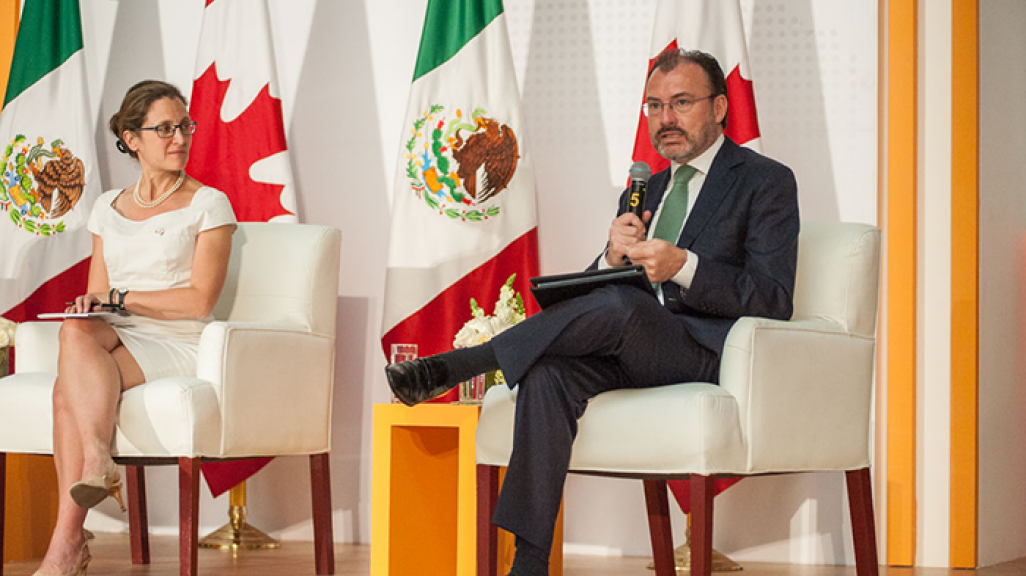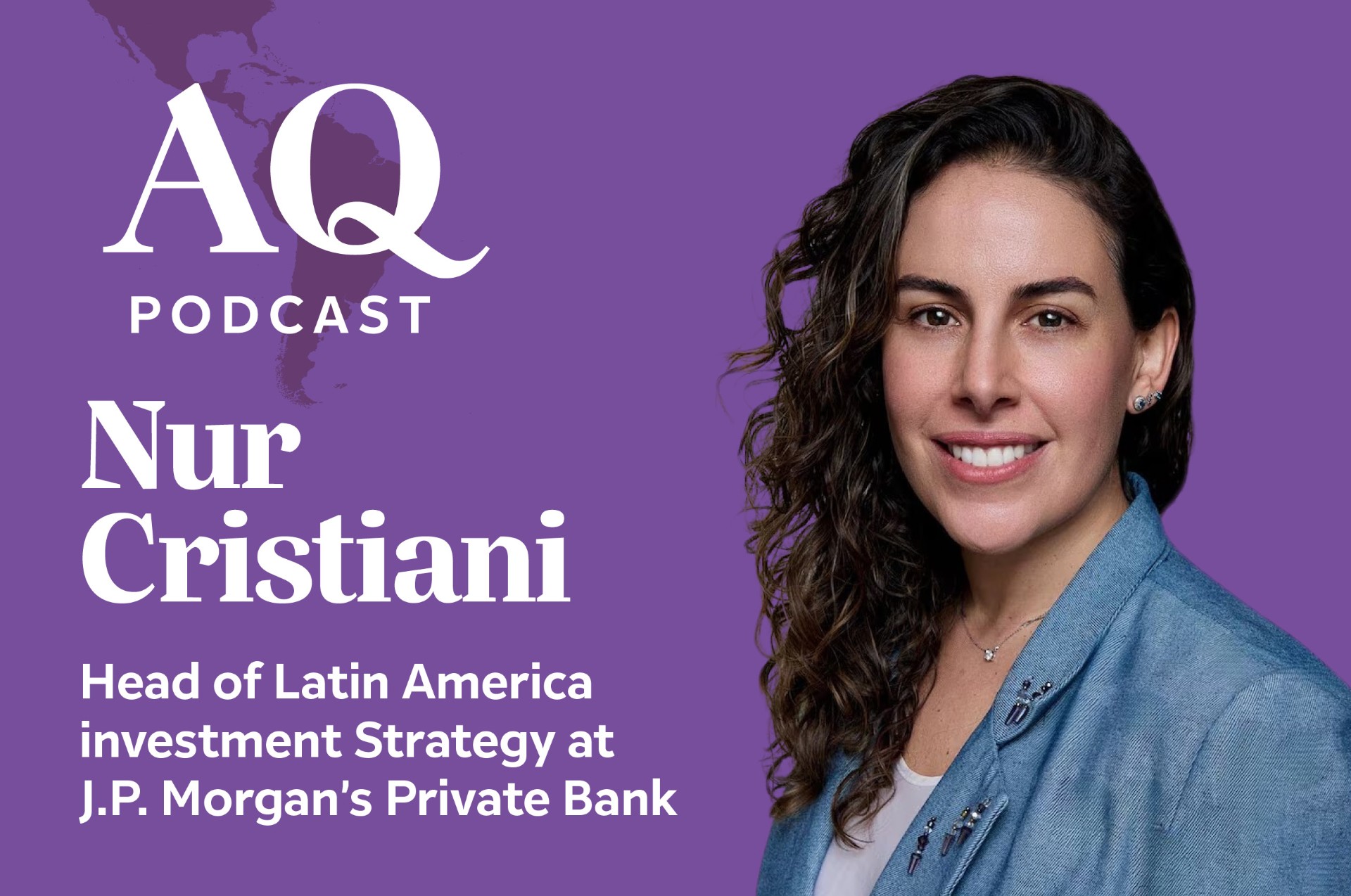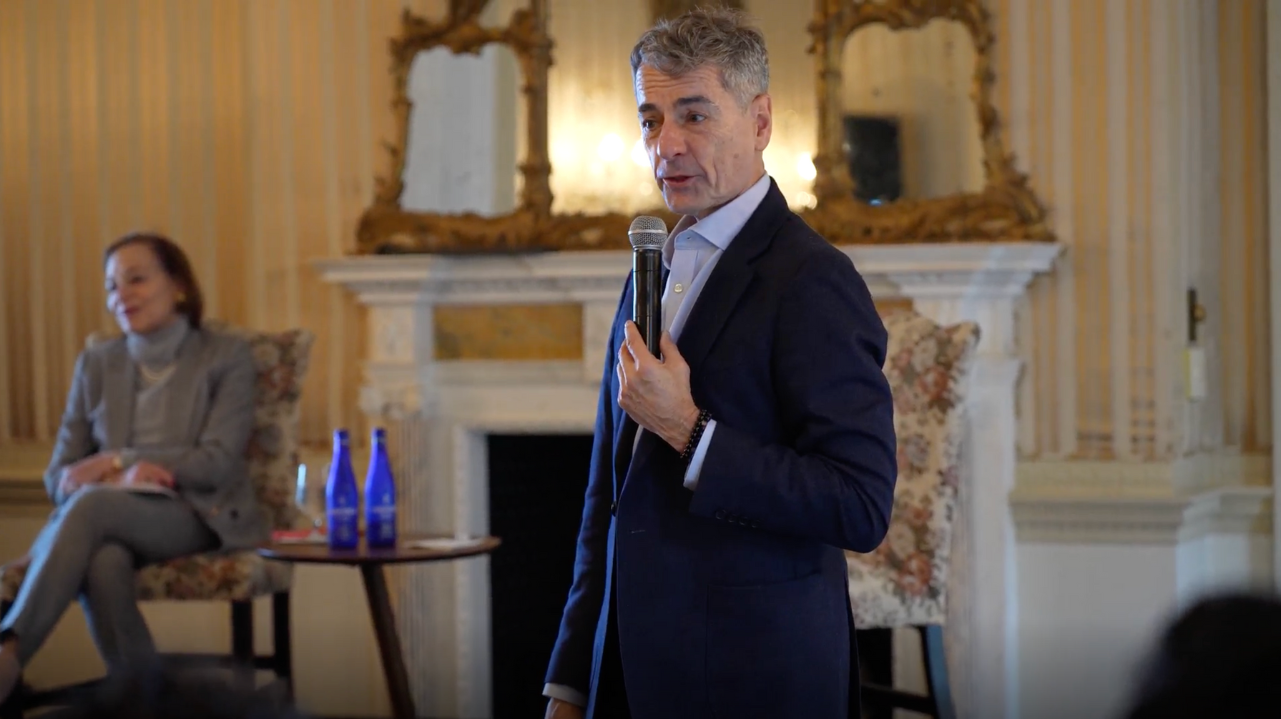Mexico 2017 Recap: Mexico and North America – A Global Powerhouse
Mexico 2017 Recap: Mexico and North America – A Global Powerhouse
Luis Videgaray, Chrystia Freeland, Ildefonso Guajardo, and José Antonio Meade, along with 6 CEOs and other private-sector leaders, all spoke at the event in the Palacio Nacional.
Speakers:
- Luis Videgaray, Mexican Secretary of Foreign Affairs
- Chrystia Freeland, Canadian Minister of Foreign Affairs
- José Antonio Meade, Mexican Secretary of Finance and Public Credit (Download his presentation.)
- Ildefonso Guajardo Villarreal, Mexican Secretary of Economy
- Juan Andrade, Executive Vice President of Chubb Group and President, Overseas General Insurance, Chubb
- Juan Pablo Castañon, President, Consejo Coordinador Empresarial (CCE)
- Juan Pablo del Valle, Chairman, Mexichem
- Yosbel Ibarra, Co-Managing Shareholder Miami office, and Co-Chair of the Latin American and Iberian Practice, Greenberg Traurig
- Moisés R. Kalach, Director, Foreign Trade Strategic Advisory Board, Consejo Coordinador Empresarial (CCE)
- Eric Lee, Energy Strategist, Commodities Research, Citigroup
- Patrick J. Ottensmeyer, President and CEO, Kansas City Southern
- Brian Porter, CEO, Scotiabank
- Carlos Manuel Rodríguez, Mexico Bureau Chief, Bloomberg News
- Juan Ignacio Rubiolo, President and CEO, AES México
- Carlos Manuel Sada Solana, Undersecretary for North America, Secretariat of Foreign Affairs
- Oscar Schmidt, Executive Vice President, CEO-Latin America, MetLife
- Susan Segal, President and CEO, Americas Society/Council of the Americas (Read her remarks.)
- Jaime José Serra Puche, Founder and President, SAI Derecho & Economía
- Blanca Treviño, President and CEO, Softtek
- Brian Winter, Editor-in-Chief, Americas Quarterly; Vice President of Policy, Americas Society/Council of the Americas
Lea una versión del resumen en español.
View the #mxASCOA discussion on Twitter.
AS/COA President and CEO Susan Segal opened the conference and said that while she would typically speak in Spanish, she chose to speak in English because, she said: “I want to be precise and I want to be on the record, not just in Mexico, but also, and importantly, in my own country.” She outlined the contributions of the North American Free Trade Agreement (NAFTA) to the economies of its three members, pointing out that 14 million U.S. jobs depend on trade between the three countries. “The reality is that we are not merely selling products to one another, but that U.S., Mexican, and Canadian manufacturers are literally building goods together,” she said, emphasizing that, while the trade accord needs modernization to handle the technological advances since its implementation, exiting the deal would result in enormous losses.
Hoy 1 de cada 29 trabajos en Estados Unidos depende del comercio con México. —@s_segal sobre el #TLCAN en #mxASCOAhttps://t.co/OglwkaRCXf pic.twitter.com/zBmereHByX
— AS/COA Online (@ASCOA) May 23, 2017
Mexican Undersecretary for North America Carlos Sada Solana talked about the economic importance of NAFTA to the North American region, noting that trilateral trade between Canada, Mexico, and the United States has grown from $290 million in 1993 before the implementation of the deal to more than $1 trillion last year. But he also stressed the personal connections between the businesses and the 500 million people who make up the three countries. The former ambassador to the United States said that all 50 Mexican consulates in the United States have set up legal defense funds to help his country’s migrants who are facing challenges such as immigration detention and deportation. He spoke of bilateral cooperation, pointing to the secretary-level meetings on May 18 in which U.S. Secretary of State Rex Tillerson said that the United States must acknowledge that drug consumption contributes to violence on both sides of the border.
.@carlomsada "Mexico is a leader in building bridges" "México preocupado por proteger los DDHH de los mexicanos" @ASCOA #mxASCOApic.twitter.com/ZFQwCmOet9
— Ginna Garnelo Calvo (@GinnaMariaGC) May 23, 2017
As far as demographics go, "Mexico has everything going for it," said Scotiabank CEO Brian Porter, citing an average age in Mexico of 27, versus over 40 in Canada and the United States. Mexico also has two other distinct advantages: skills (graduating more engineers per year than Germany or Brazil) and trade, with FTAs with dozens of countries. Issues with rule of law, however, “have definitely been a friction point,” saying he recently fielded questions from an investor about how to determine who owns certain pieces of land. “This is an issue that’s going to need clarity if Mexico hopes to get more FDI in some particular industries.” Asked about his thoughts about a possible U.S. border-adjustment tax, Porter said he was concerned. “Let free-standing currencies do their work,” he said. On NAFTA, Porter echoed a theme of the day that modernization, and not withdrawal, should be the goal. “The reality is, this isn’t about trade—trade’s created jobs—it’s about the adoption of technology in all businesses.”
#mxASCOA México está en nuestro top para invertir; trabajaremos en hacer todo más fácil para los clientes: CEO de @ScotiabankViews pic.twitter.com/04YhQBEJ1j
— El Financiero (@ElFinanciero_Mx) May 23, 2017
In his remarks, Mexico’s Economy Secretary Ildefonso Guajardo said that it will be crucial to have clear goals in NAFTA renegotiations, which are slated to start in August, and he added that negotiations won’t go anywhere without recognition that all three countries have benefited from the accord. The secretary said he’d steer away from using the word “optimistic” about NAFTA talks, but said he felt positive that the talks could support what has been built in North America since the deal’s implementation over 20 years ago. He noted that modernization is necessary, and that even though the White House had pulled the United States out of the Trans-Pacific Partnership (TPP), there had been recognition that TPP had taken steps to address aspects of the tech revolution that are not currently a part of NAFTA.
Podemos llegar a una nueva negociación conservando la generación de valor en América del Norte - @ildefonsogv #mxASCOA #TLCAN pic.twitter.com/qgJd4lH7ZG
— SE México (@SE_mx) May 23, 2017
Guajardo pointed out that Washington is seeking to reduce its trade deficit, but he said that any steps to address these deficits should involve an expansion rather than a limitation of free trade.
Interesting point by @ildefonsogv at the #mxASCOA meeting: any NAFTA renegotiation needs to increase trade, not curtail it pic.twitter.com/ex48sb35Ho
— JP Spinetto (@JPSpinetto) May 23, 2017
Next up, Americas Quarterly Editor-in-Chief and AS/COA Vice President Brian Winter moderated the panel “A Conversation on the Future of NAFTA” that offered a private-sector view of what’s ahead for North America. Kansas City Southern CEO Patrick Ottensmeyer noted that a disruption of NAFTA would be disastrous for U.S. agribusiness. He also said that negotiations would be positive if taken with a macro view rather than getting trapped in the needs of each sector. CCE’s Moisés Kalach also voiced that it is necessary to avoid what he called the “Christmas tree effect.”
.@moikaba on #NAFTA negotiations: if everybody hangs what they want on the Xmas tree, it's going to be a big mess. #mxASCOA
— AS/COA Online (@ASCOA) May 23, 2017
The world today is very different from the world in 1994 when NAFTA was signed, which means its modernization provides an opportunity to bring the trade agreement up-to-date with the vast technological advances the world has seen since. To wit, Softtek CEO Blanca Treviño noted how four of the five largest U.S. companies today are technology companies like Apple and Google, while in 1994 they were automotive companies like General Motors. Chubb's Juan Andrade agreed the deal can be updated and warned about the dangers of interrupting more than $1 trillion dollars worth of annual trilateral commerce and how trade barriers would be “devastating” to workers and all economic sectors across the continent. Juan Pablo Castañon said he'd like to see intraregional trade of Mexican states grow even more, noting how in Europe, intraregional trade accounts for 70 percent of total trade, while in North America it stands at 50 percent. He also emphasized his own country's need to evolve and keep up with the pace of change in the world. "We can't move toward the future with our eyes on the rearview mirror." Castañon public policy should work to bring prosperity to the areas most in need in the south and southeast Mexico. He and Treviño also urged Mexicans to encourage and take on a more entrepreneurial mindset.
4 out of the top 5 US companies today are tech companies. When NAFTA was signed these were automakers - Blanca Treviño CEO @Softtek #mxASCOA https://t.co/fc4mFGCmvv
— Alex Camino (@globalnearshore) May 23, 2017
One of the sectors squarely in the middle of the NAFTA debate is energy, which the next panel took up. And Mexico is sitting on some of the lowest natural gas and power prices in the world, said Eric Lee of Citi. So how should Mexico balance low natural gas prices in the United States while not becoming dependent on imports? asked moderator Carlos Rodríguez of Bloomberg. Diversify and position itself as the best market for U.S. natural gas, said Juan Ignacio Rubiolo, president and CEO of AES México. Long-term, any company that invests in Mexico’s energy will do well thanks to President Enrique Peña Nieto’s reforms to the sector, said Mexichem Chairman Juan Pablo del Valle, though Pemex could work to refine the process to bring its energy auctions more in line with other countries’ offerings. The biggest uncertainty for the sector, said del Valle, isn’t NAFTA or the policies of U.S. President Donald Trump, but domestic politics, such as the proposal of MORENA—the political party with the potential to win next year's presidential election—to reexamine the energy reform.
Espectacular mesa sobre la Integración Energética en América del Norte #mxASCOA @ASCOAMedia @ASCOA @ascoaYPA @Citi @carlos_rgz @business pic.twitter.com/tzEFYr0pQm
— Ginna Garnelo Calvo (@GinnaMariaGC) May 23, 2017
To close the day, MetLife's Oscar Schmidt took the stage to present the final speaker, Finance and Public Credit Secretary José Antonio Meade. Schmidt praised the secretary's work to maintain a degree of stability in México amid global uncertainty and tense relations with the United States. He also extolled his company's success as one of the first to benefit from NAFTA. Meade then presented on the factors he believes have sustained Mexico's economy and stability throughout the years. "Mexico is the Moneyball of emerging economies," he said, largely due to the structural reforms that have allowed the country to be flexible, robust, and resistant in times of crisis. For example, Mexico was able to mitigate the drop in oil prices of the last three years thanks to its tax reform. The secretary went on to speak about Mexico's permanence on the world stage and its incontrovertible links with the United States. "Without Mexico, North America would not be the global powerhouse it is today," he said.
Powerful illustration by @JoseAMeade at #mxASCOA. Can you pinpoint the US-Mex borderline? Power lines, oil & gas pipelines, roads, railways. pic.twitter.com/MRIJlVOnvE
— Alex Camino (@globalnearshore) May 23, 2017









